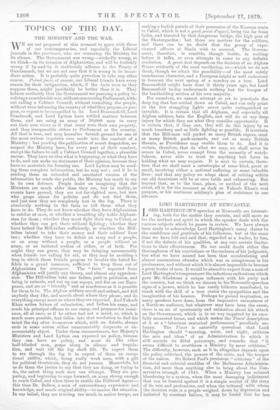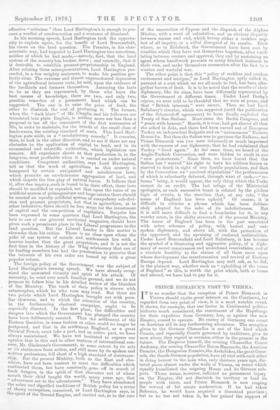LORD HARTINGTON AT NEWCASTLE.
IORD HARTINGTON'S speeches at Newcastle are interest- ing, both for the matter they contain, and still more so. for the method and spirit in which the speaker deals with the various subjects which he passes in review. We have always been ready to acknowledge Lord Hartington's many claims to the confidence and gratitude of his followers, but at the same time we have felt and said that, regarded as a leader, he has, if not the defects of his qualities, at any rate certain limita- tions to their effectiveness. No one could doubt either the
of his convictions or the coolness of his judgment.,
but what we have missed has been that uncalculating and almost unconscious abandon which was so conspicuous in his predecessor, and without which it is almost impossible to become a great leader of men. It would be absurd to expect from a man of Lord Hartington's temperament the infectious enthusiasm which gave Mr. Gladstone a unique influence with his party and the country, but we think we discern in his Newcastle speeches signs of a power, which he has rarely hitherto manifested, to touch with the skill of a true orator the sympathies and the imagination of his hearers. Perhaps he gained inspiration, as= many speakers have done, from the impressive earnestness of a Northern audience, but whatever may have been the cause, there is an air of spontaneity and animation about his attack on the Government, which is in no way impaired by its care- fully measured terms, and which makes the 'rimed description, of it as a "laborious oratorical performance" peculiarly un- happy. The Times is naturally querulous that Lord Hartington should "morning, noon, and night, criticise the acts and ideas" of an Administration to which it still accords its fitful patronage, and remarks that "it seems difficult to overthrow a Ministry by mere criticism.' The difficulty, however, such as it is, altogether depends upon the policy criticised, the powers of the critic, and the temper of the nation. Sir Robert Peel's persistent " criticism " of the financial and colonial muddles of the Melbourne Adminietra-
tinn, did more than anything else to bring about the Con- servative triumph of 1841. When a Ministry has reduced blundering to a system, when the most damaging indictment that can be framed against it is a simple recital of the story of its acts and professions, and when the tribunal with whom the decision rests is a people weighed down by depression and irritated by constant failure, it may be found that far less effective " criticism " than Lord Hartington's is enough to pro- cure a verdict of condemnation and a sentence of dismissal.
In his morning speech, Lord Hartington took the opportu- nity to explain again, for the benefit of Lord Beaconsfield, his views on the land question. The Premier, in his char- acteristic way, had imputed to Lord Hartington two assertions, neither of which he had made,—namely, first, that the land system of the country has broken down ; and secondly, that it is desirable to establish peasant-proprietorship in England. After refuting these misrepresentations, Lord Hartington pro- ceeded, in a few weighty sentences, to make his position per- fectly clear. The extreme and almost unprecedented depression of the agricultural interest rests, he said, upon the evidence of the landlords and farmers themselves. Assuming the facts to be as they are represented, by those who have the best means of knowledge, there are two, and only two, possible remedies of a permanent kind which can be suggested. The one is to raise the price of food, the other to diminish the cost of producing it. The former, when the "dark hints" of Mr. Chaplin and his followers are translated into plain English, is neither more nor less than a proposal to tax all the consumers of the first necessaries of life, in order to maintain, for the benefit of the small class of landowners, the existing standard of rents. This Lord Hart- ington puts aside, as a "revolutionary remedy." It remains, then, to look in the other direction, and to see if there are any obstacles to the application of capital to land, and to its economical and scientific cultivation, which legislation can remove. All experience shows us that production is, in the long-run, most profitable when it is carried on under natural conditions. Competent authorities, says Lord Hartington, tell us that the work of agriculture in this country is hampered by certain antiquated and mischievous laws, which promote an unwholesome aggregation of land, and which impede the free play of natural forces. It follows that if, after due inquiry, such is found to be their effect, these laws should he modified or repealed, not that upon the ruins of an artificial system of primogeniture and large estates there should be erected an equally artificial system of compulsory sub-divi- sion and peasant proprietors, but that in agriculture, as in other industries, there should be free scope for the investment of capital and the competition of capitalists. Surprise has been expressed in some quarters that Lord Hartington, the heir to one of our greatest territorial magnates, should have given such a prominent place in the Liberal programme to the land question. But the Liberal Leader in this matter is shrewder than his critics. There is no class upon whom the yoke of our system of entails and, settlements lies with a heavier burden than the great proprietors, and it is not the first time in the history of the Whig aristocracy that one of its leading members has had the penetration to perceive that the interests of his own order are bound up with a great popular reform.
The foreign policy of the Government was the subject of Lord Hartington's evening speech. We have already recog- nised the unwonted vivacity and spirit of his attack. Of necessity, he went over much familiar ground, and we do not propose to follow him in his detailed review of the blunders of the Ministry. The track of their policy is strewn with catastrophes, which he who runs may read. But there are two points which Lord Hartington brought out with pecu- liar clearness, and to which the attention of the country, in the forthcoming electoral campaign, ought to be especially directed. In the first place, the difficulties and dangers into which the Government has plunged the country have been deliberately courted. That the settlement of the Eastern Question, in some fashion or other, could no longer be postponed, and that in its settlement England, as a great Oriental Power, must take a part, and an active part, we have always maintained. We have not hesitated to express our Opinion that in this and in other matters of international con- cern, Mr. Gladstone's Government, to some extent by its acts or its abstinence from action, and still more by its spoken and written professions, fell short of a high standard of statesman- ship. But the present Ministry, both in the East and else- where, have not been content to meet the difficulties which confronted them, but have constantly gone off in search of fresh dangers, in the spirit of that character out of whose mouth their chief taught the world, many years ago, that "adventures are to the adventurous." They have abandoned the sober and dignified traditions of British policy for a series of showy enterprises, conceived, as Lord Hartington says, in the spirit of the Second Empire, and carried out, as in the case of the annexation of Cyprus and the dispatch of the Afghan Mission, with a want of calculation, and an obvious disparity between means and end, which °betray either a reckless neg- lect of all inquiry, or a wilful disregard of its results. Even where, as in Zululand, the Government have been net by troubles which they have not themselves begotten, after vacil- lating between censure and approval, they end by sustaining an agent whose handiwork presents so many kindred features to their own, and make themselves accessories after the fact to a wanton and wasteful war.
The other point is that this " policy of reckless and restless excitement and intrigue," as Lord Hartington aptly called it, pursued at a cost which we are all made to feel, has been alto- gether barren of fruit. It is to be noted that the results of their diplomacy, like its aims, have been differently represented by the Government at different times. Under. Lord Derby's regime, we were told to be thankful that we were at peace, and that "British interests" were secure. Then we had Lord Salisbury's circular, which was supposed (until the publication of the Schouvaloff agreement) to have finally exploded the Treaty of San Stefano. Next came the Berlin Congress, and "peace with honour." Russia, it is true, had got almost all that she asked in Asia, and there had been carved out of European Turkey an independent Bulgaria and an "autonomous" Eastern Roumelia. But then the Sultan was to garrison the Balkans, and Prince Bismarck was (we were informed) so much impressed with the success of our diplomacy, that he had exclaimed that Turkey "lived again." At the same time, we heard of the Anglo-Turkish Convention, and were bidden to exult in our "new protectorate." Since then, we have learnt that the Sultan has " waived " his right to have his soldiers frozen or starved to death in sight of two hostile populations, and that by the Convention we" received stipulations " the performance of which is reluctantly deferred, through want of cash,—" re- forms" being, it would appear, the only thing which the Turks cannot do on credit. The last refuge of the Ministerial apologists, as each successive boast is refuted by the pitiless logic of events, is the assertion that, at any rate, "the name of England has been upheld." Of course, it is difficult to criticise a phrase which has been deliber- ately adopted for the sake of its indefiniteness. But it is still more difficult to find a foundation for it, in any worthy sense, in the shifty statecraft of the present Ministry. The name of England has been in the past associated with sober schemes of policy, with honest and out- spoken diplomacy, and above all, with the protection of the oppressed, and the upraising of enslaved nationalities. Under Lord Beaconsfield and Lord Salisbury, it has become the symbol of a blustering and aggressive policy, of a diplo- macy of secret connivances and underhand reservations, and of a resolute hostility to the claims of all those races upon. whose development the transformation and revival of Eastern Europe depend. Lord Hartington may well ask, as ho aid, in the plainest way, whether such an "upholding of the name of England" as this, is worth the price which, both at home and abroad, we have had to pay for it.



































 Previous page
Previous page